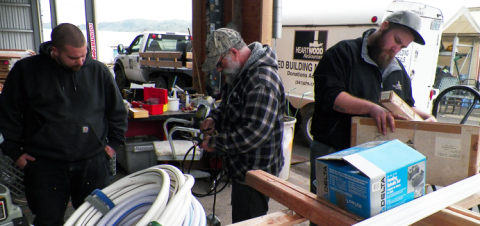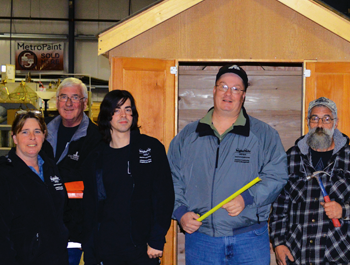Image

Mickey Beach, CEO, NeighborWorks Umpqua
Dennis Bartlett, director of Heartwood ReSources
NeighborWorks Umpqua's wholly owned subsidiary/social enterprise Heartwood ReSources
Challenge: Two problems faced the community of Umpqua in the early 2000s. First, commercial builders were filling up the county landfill. (And county leaders were loath to impose fees that would be a political liability at election time.) Second, residents, especially those with limited income, couldn't find enough low-cost home-repair materials. NeighborWorks Umpqua saw an opportunity.
Heartwood Resources started in 2002 as a social enterprise business by Umpqua Community Development Corporation, now NeighborWorks Umpqua. Its purpose was fourfold:
- Extend the life of the county landfill by reclaiming area building materials through deconstruction and salvage efforts.
- Make those materials available at reasonable prices.
- Provide jobs and jobs training for low-income people in Douglas County.
- Encourage positive environmental stewardship through wise use of resources.
We developed relationships with our workforce development organization, county recycling staff, and the home builders association. We also joined national organizations specializing in building material re-use. To bring it all together, we pursued and received grant funds from the Office of Community Services Job Opportunities for Low-Income Individuals.
With donated help from the county's inmate work crew, Heartwood Resources started in an abandoned warehouse near downtown Roseburg, with a two-pronged mandate: a retail store and deconstruction business.
The deconstruction business failed because there simply weren't enough viable structures to remove. Those available for deconstruction were often substandard structures such as prefabricated homes from the 1960s and '70s. The salvage value couldn't even support a crew.
The retail operation started slow, but showed promise. However, poor location, insufficient stock, and a depressed economy nearly closed the fledgling business. We survived by concentrating our efforts and resources on the retail operation, and shifting away from the deconstruction business.
 Then, just as we started to show some success, our building changed hands and our rent tripled. The board, now more comfortable with the risk involved, gave us authority to redevelop a site that would better accommodate us. We purchased 2 acres that included a few, mostly useless buildings, and built a metal structure with radiant floor heat fueled from waste-wood materials.
Then, just as we started to show some success, our building changed hands and our rent tripled. The board, now more comfortable with the risk involved, gave us authority to redevelop a site that would better accommodate us. We purchased 2 acres that included a few, mostly useless buildings, and built a metal structure with radiant floor heat fueled from waste-wood materials.How did we make this enterprise work considering the obstacles? The short answer is hard work, persistence and commitment. We wanted to become a community resource. We took the "resource" in our name seriously.
We had to become the place everyone called when they wanted to dispose of unwanted building materials, and we had to become the place the public called on to acquire those materials. The key to getting donations was to make it easy for donors, so we arranged for pickup and gave a tax-deductible receipt.
Educating the public about our services was not as easy. After trying different strategies, the best one turned out to be word-of-mouth: People got to like what we were doing and they told others about it. We learned how to get people's attention — we had fun with it.
In just one example, we lined the storefront with hundreds of bar stools we received from a nearby casino. When word got out that they were going for $5 each, there was a community-wide frenzy to get at least one.
We've employed the tactic many times since. The public loves it, and we are able to manage the quantities and make money.
We work to make our business a resource for everyone. We have several programs that offer materials, such as planter pots and egg cartons, at no cost. Contractors use us for everyday items such as doors, windows, cabinets, plumbing and lighting fixtures and crafters use us for unique broken and salvaged items.
We continually find ways to promote re-use of materials, often in novel ways: A greenhouse made from shower doors, a broadcast TV antenna made from old satellite antennas, a bench made from bed headboards, are all examples of creative reuse of surplus.
And we engage with community in other ways as well: We hold "junk art" contests and give woodworking seminars at schools without industrial arts programs. Most people just call us Heartwood, but we truly live up to the "Resources" part of our name.
We have learned four solid lessons:
- Carefully hire your staff and have enough confidence to let them do their jobs.
- Keep your eye on policy issues that affect your business and become involved if possible.
- Keep an open door, open mind, and open ears, because life is what happens when you're busy planning.
- Don't get pulled in too many directions. Focus on initial points of purpose — this helps you keep your business on course, retain your identity, and achieve your goals.

